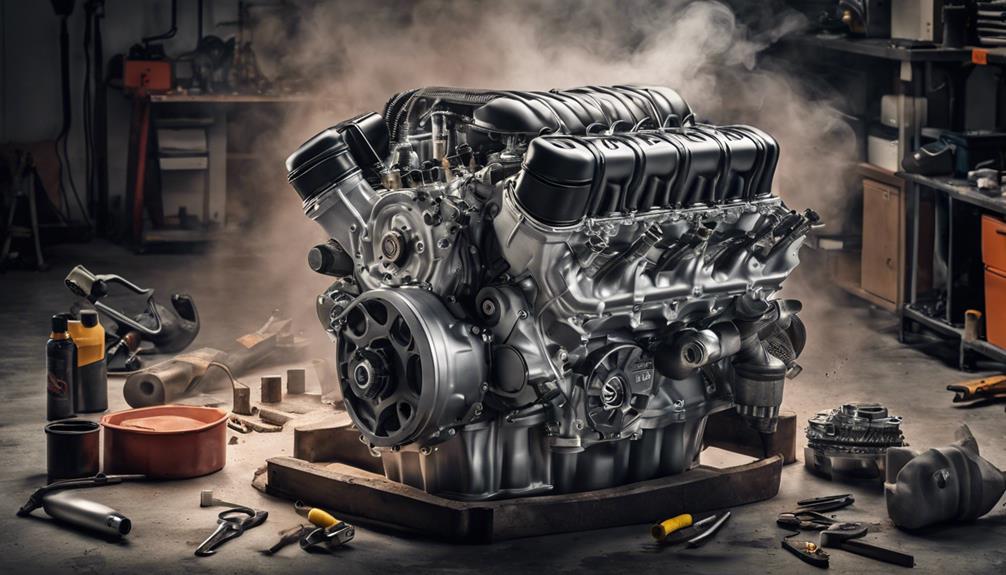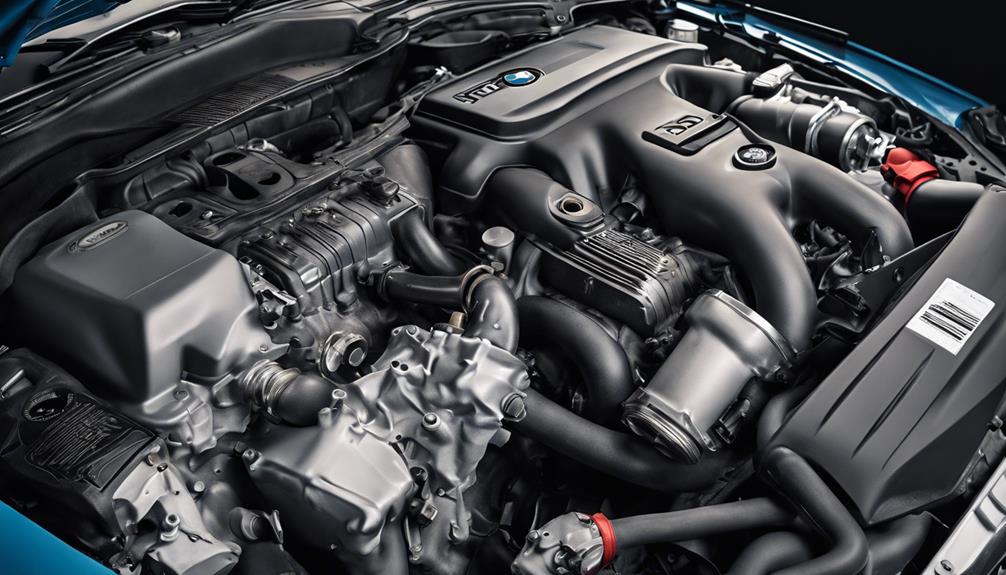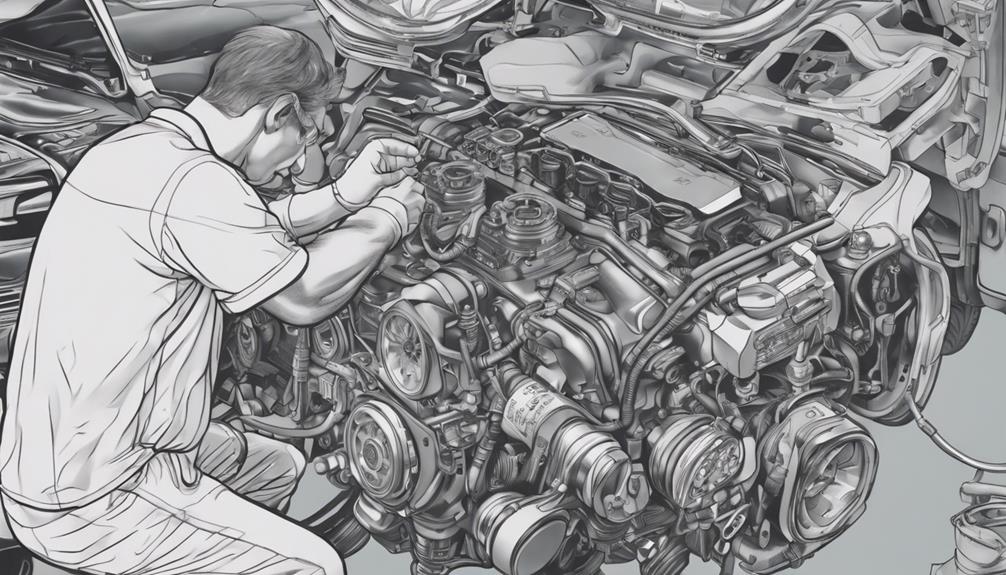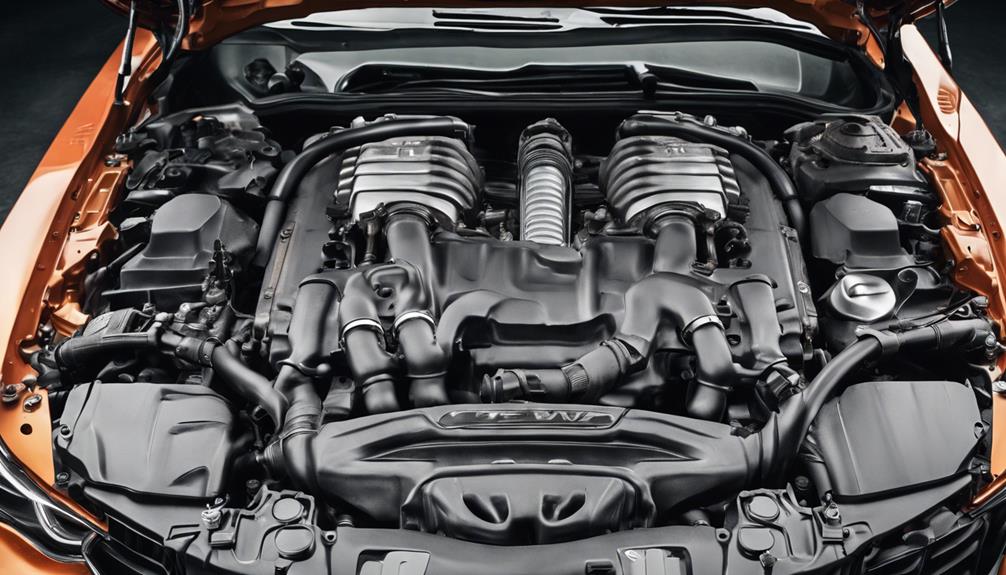If you're driving a BMW 116i, you may encounter issues like struggles with the automatic gearbox, dealing with diesel exhaust noise, facing engine timing chain problems leading to rattling noises, experiencing clutch seizures in the manual gearbox, and noticing drivetrain vibrations. From gearbox interlock solenoid faults to faulty exhaust flexpipes, these challenges can impact your driving experience. Timely addressing and maintenance are essential to ensuring peak performance. Be proactive in resolving these common problems to avoid further complications and keep your BMW running smoothly. Further insights into maintenance and solutions are available within the details provided.
Key Takeaways
- Gear selector issues like difficulty shifting and stuck positions may indicate a faulty gearbox interlock solenoid.
- Diesel models may experience annoying droning noise from a faulty exhaust flexpipe affecting driving comfort.
- Rattling noises under the hood could signal engine timing chain problems, requiring prompt attention for maintenance.
- Manual gearbox may suffer from clutch seizures causing jerky movements, necessitating timely repairs to prevent further damage.
- Drivetrain vibrations, felt during idling or acceleration, could be due to worn CV joints or imbalanced driveshafts, warranting diagnosis and repairs.
Automatic Gearbox Issues

If you're facing challenges shifting your BMW 116i's gear selector from 'P' to 'D' or 'R', automatic gearbox issues could be the cause. One common reason for this issue is a faulty gearbox interlock solenoid, which can result in the gear selector getting stuck in certain positions.
To tackle this problem, replacement of the gearbox interlock solenoid may be required. Moreover, adjusting the gear selector cable is a common solution for automatic gearbox issues in the BMW 116i.
The Haynes manual provides valuable guidance on diagnosing and resolving these gearbox problems effectively. By understanding how the gear selector cable and gearbox interlock solenoid operate within your BMW 116i's automatic transmission system, you can take proactive steps to ensure smooth gear shifting.
Diesel Exhaust Noise
Experiencing an annoying droning sound from your BMW 116i diesel model? This issue could be stemming from a faulty exhaust flexpipe, which can greatly impact your driving experience. BMW has acknowledged this issue and introduced an enhanced part to replace the damaged exhaust flexpipe. The Haynes manual provides detailed instructions on how to carry out this replacement effectively. Addressing the exhaust flexpipe problem promptly is essential to restore the joy of driving your BMW 116i diesel model.
| Common Issue | Solution |
|---|---|
| Droning noise from exhaust flexpipe | Replace the exhaust flexpipe with the enhanced part from BMW |
| Impact on driving experience | Follow Haynes manual for a successful replacement procedure |
Engine Timing Chain Problems
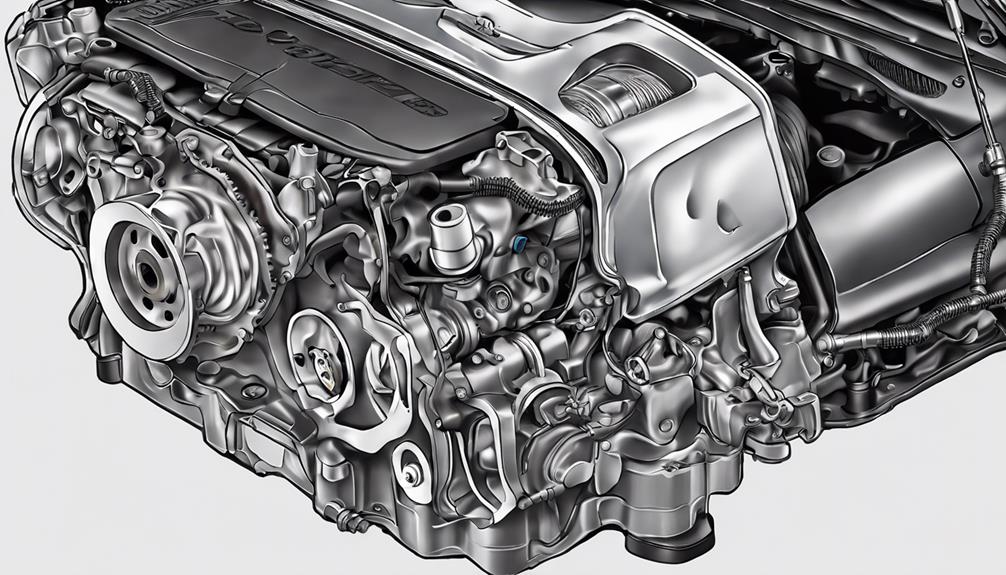
You've heard that unsettling rattling noise from under the hood of your BMW 116i; it could be a sign of chain tensioner failure or timing chain stretching.
These issues can lead to engine misfires and diminished performance, potentially causing costly damage if left unattended.
Don't let these timing chain problems catch you off guard – stay vigilant and address them promptly to keep your BMW running smoothly.
Chain Tensioner Failure
When facing chain tensioner failure in the BMW 116i, engine timing chain problems can arise, potentially leading to significant engine performance issues. Here are three key points to keep in mind:
- Listen Up: If you start hearing unusual engine rattling or experience rough idling, it could be a sign of chain tensioner issues affecting the timing chain alignment.
- Timely TLC: Regular maintenance and prompt replacement of the chain tensioner are essential to prevent more severe engine damage down the road.
- Pro Diagnosis: Trust a qualified mechanic to diagnose the problem accurately. They can determine if chain tensioner failure is the underlying cause of the timing chain woes in your BMW 116i. Remember, early detection saves engines!
Timing Chain Stretching
In the domain of BMW 116i maintenance, addressing timing chain stretching promptly is paramount to prevent potential engine malfunctions. The BMW 116i is prone to timing chain stretching issues, which can lead to troublesome engine misfires. This problem can manifest as rough idling and sluggish acceleration, signaling that the timing chain may need attention.
To dodge significant engine setbacks, regular maintenance checks and timely replacement of the timing chain are non-negotiable. Keep an ear out for any unusual rattling noises emanating from the engine and be vigilant for the dreaded check engine light, as these could be indicators of timing chain distress.
Engine Misfires
To unravel the mystery behind engine misfires in your BMW 116i, explore the intricate network of timing chain problems. When your timing chain is off, it's like a conductor leading a symphony out of tune – misfires are the sour notes.
Here's what you should know:
- Symptoms Speak Volumes: Listen to your engine; rough idling and power loss are its distress signals.
- Timing is Everything: Literally, in this case. A faulty timing chain can throw off the engine's rhythm, causing misfires.
- Act Swiftly: Don't let misfires linger. Promptly addressing timing chain issues can save you from costly engine repairs down the road.
Clutch Seizures in Manual Gearbox
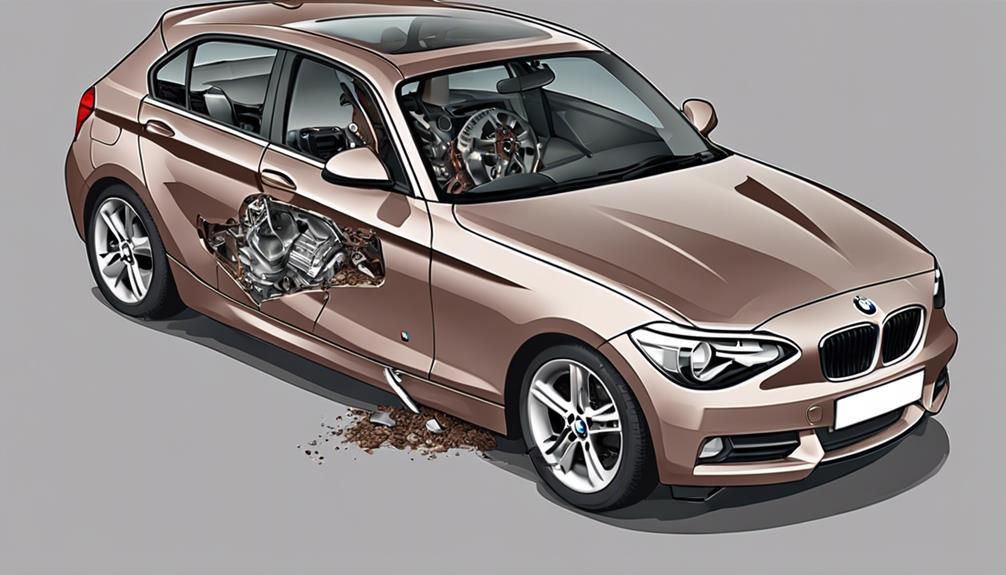
If you find yourself struggling to smoothly shift gears in your BMW 116i manual gearbox, clutch seizures might be the culprit.
This issue, often caused by wear and tear, can lead to jerky movements and gear stickiness.
Addressing this promptly is key to preventing further transmission woes.
Clutch Wear and Tear
Have you ever experienced the frustration of struggling to smoothly shift gears in your BMW 116i due to clutch seizures caused by wear and tear? Clutch wear and tear are common issues in the BMW 116i, leading to the dreaded seized clutch in the manual gearbox. When this happens, you might find yourself grappling with gear shifts, feeling like you're in a battle of wills with your own car.
Here are a few things to keep in mind:
- The clutch seizing can result in an unpleasant grinding sensation, almost like your car is protesting each gear change.
- Overlooking clutch problems can have a significant impact on your driving experience, making each journey a bit more stressful.
- Addressing clutch issues promptly can save you from further gearbox complications down the road.
Gear Shifting Issues
Experiencing gear shifting issues due to clutch seizures in your BMW 116i can turn each drive into a bumpy ride filled with frustrating gear changes. When clutch seizures occur in the manual gearbox, you might notice difficulties in smoothly engaging gears or increased resistance in the gear shifter.
These issues can manifest as unpleasant grinding or crunching noises during gear shifts, disrupting the driving experience. To address clutch seizures, it's often necessary to replace the clutch assembly, resolving the underlying problem causing the gear shifting issues.
Gear Selector Difficulty
When encountering gear selector difficulty in your BMW 116i, addressing the gearbox interlock solenoid is important for resolving the issue efficiently. Here are three vital steps to tackle this problem:
- Check the Gear Selector Cable: Sometimes, the gear selector cable might be misadjusted, causing issues in shifting between gears. Referring to the Haynes manual for guidance on adjusting this cable can often rectify the gear selector difficulty without the need for more complex solutions.
- Inspect for Wear and Tear: Over time, the gear selector cable or its components may experience wear and tear, leading to improper functioning. By visually inspecting these parts for any signs of damage, you can determine if a replacement or repair is necessary to restore smooth gear shifting.
- Consult a Specialist: If troubleshooting the gear selector cable and other basic checks don't alleviate the gear selector difficulty, seeking assistance from a BMW specialist or mechanic familiar with the 116i model can provide expert insight and solutions tailored to your specific issue.
Gearbox Interlock Solenoid Faults

The gearbox interlock solenoid in the BMW 116i model plays an important role in enabling smooth shifts between gears. When this component malfunctions, you may experience difficulty moving the gear selector from 'P' to 'D' or 'R'. Addressing gearbox interlock solenoid faults is vital for peak performance. Consulting the Haynes manual can provide valuable insights on resolving these issues. Below is a table summarizing key points related to gearbox interlock solenoid faults in the BMW 116i:
| Gearbox Interlock Solenoid Faults |
|---|
| – Causes gear selection issues |
| – Replacement may be necessary |
| – Haynes manual offers guidance |
| – Adjust gear selector cable |
| – Ensure timely maintenance |
Engine Grinding Noise
Curiously, what ominous indication in your BMW 116i could suggest underlying issues with its timing chain components? When you hear that unsettling engine grinding noise, it's like your car's way of whispering, 'Hey, something's up with my timing chain!'
Here are three things to ponder:
- Mileage Matters: The grinding noise in your BMW 116i could be a sign of wear and tear on the timing chain due to the miles it has clocked. Just like a well-loved pair of sneakers, these components can start showing their age over time.
- Replacement Required: Addressing the grinding noise may involve swapping out some timing chain parts. It's like giving your engine a fresh set of gears to dance to – ensuring smooth operation and longevity.
- Don't Delay: Ignoring the engine grinding noise in your BMW 116i could snowball into more severe damage and hefty repair bills. Tackling this issue promptly is key to keeping your ride running smoothly.
Faulty Exhaust Flexpipe

Experiencing a droning noise while driving your BMW 116i could indicate a potential issue with the faulty exhaust flexpipe. The exhaust flexpipe plays an essential role in the vehicle's exhaust system, and when it malfunctions, it can result in discomfort due to increased noise levels within the cabin. BMW has acknowledged this issue and introduced an improved part for replacement to address the damaged flexpipe effectively. Following the replacement guidelines provided by BMW is vital to address this issue promptly and guarantee a smoother driving experience. Timely maintenance and adherence to replacement guidelines can prevent further complications related to the exhaust system and maintain the overall performance of your BMW 116i.
| Exhaust Flexpipe Issue | Replacement Guidelines |
|---|---|
| Droning noise while driving | Follow BMW's replacement instructions |
| Impact on cabin comfort | Use improved part for replacement |
| Importance of timely replacement | Prevent further exhaust system problems |
| Maintenance for overall performance | Guarantee a smoother driving experience |
Drivetrain Vibration
If you're noticing persistent vibrations while driving your BMW 116i, the culprit may lie in worn-out or unbalanced drivetrain components such as engine mounts, CV joints, or driveshafts.
Here are three possible reasons for the drivetrain vibration:
- Essential Engine Mounts: Engine mounts are essential for minimizing vibrations from the engine to the chassis. Over time, these mounts can wear out, leading to increased vibrations felt inside the car. If you feel excessive shaking, especially during idling or acceleration, worn engine mounts could be the issue.
- Worn CV Joints: Constant velocity (CV) joints are responsible for transferring power from the transmission to the wheels. When these joints wear out, they can cause vibrations, especially during turns. Listen for clicking noises while turning and pay attention to any vibrations that coincide with these movements.
- Imbalanced Driveshafts: Driveshafts transfer power from the transmission to the wheels. If a driveshaft is imbalanced due to damage or wear, it can cause noticeable vibrations, especially at higher speeds. A mechanic can diagnose this issue by inspecting the driveshaft for any visible damage or signs of imbalance.
Frequently Asked Questions
How Reliable Is the BMW 116i?
Reliability varies with the BMW 116i. Its chain-driven engine may face tensioner issues affecting dependability. Torque dips at low revs can hinder performance. Expect higher fuel consumption compared to peers. Achieves 25 mpg in cities and 35 mpg on highways.
What Are the Common Faults on a BMW 1 Series?
You might notice tensioner slippage in the chain-driven engine or feel the BMW 116i lacking torque at low revs. Expect higher fuel consumption and watch out for clutch issues such as potential flywheel vibrations.
Is BMW 1 Series Cheap to Maintain?
Maintaining a BMW 1 Series can be affordable overall, but specialized parts and services might come at a higher price. Keep up with regular maintenance to avoid costly surprises. In the end, striking a balance between quality and cost is key.
Are BMW 1 Series Engines Reliable?
When caring for your BMW 1 Series engine, regular maintenance and following manufacturer guidelines can enhance reliability. These engines, like the 116i, are designed for a balance of power and efficiency, ensuring performance and longevity.
Conclusion
Overall, owning a BMW 116i may come with its fair share of common problems such as automatic gearbox issues, engine timing chain problems, and clutch seizures.
However, with proper maintenance and care, these issues can be mitigated. Keep an eye out for warning signs and address them promptly to guarantee your BMW 116i runs smoothly and efficiently.
Remember, a little prevention goes a long way in avoiding costly repairs down the line.






